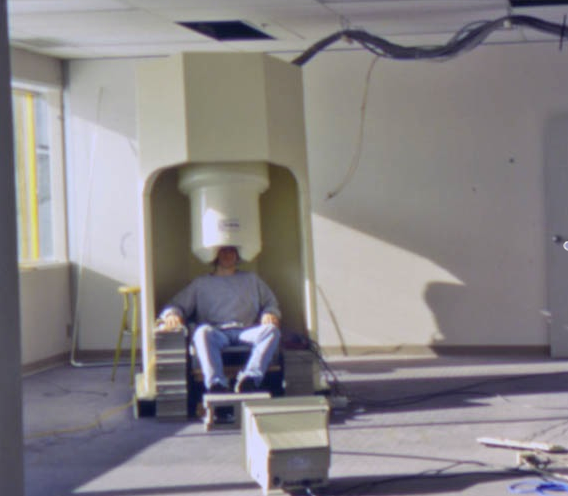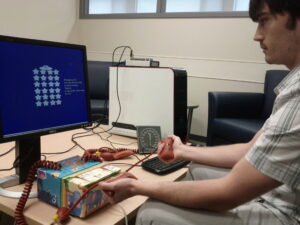Did you know…?

One of the world’s first whole-head MEG scanners was developed at CTF in Canada and installed at Simon Fraser University in the early 1990s
Investigating the neural basis of motor and cognitive disabilities following childhood stroke
Principal Investigators:
Douglas Cheyne, PhD, Program in Neuroscience and Mental Health, The Hospital for Sick Children
Nomazulu Dlamini MD, Division of Neurology, The Hospital for Sick Children
Co-investigators:
Andrea Kassner PhD, Program in Translational Neuroscience, The Hospital for Sick Children
Robyn Westmacott, The Hospital for Sick Children
Funded by: Canadian Institutes of Health Research (CIHR)
Currently there is very little understanding of why some stroke patients develop dystonic symptoms, usually appearing several months following their stroke, and why this is more prevalent in children. This 5-year CIHR funded project focuses on the use of MEG and MRI brain imaging in children recovering from stroke who may develop hemidystonia or other motor disorders. We combine these neuroimaging measures with somatosensory, motor tasks in children following their stroke to assess neuroplastic changes in specific brain regions that might reveal the underlying cause of their dystonia. We also use cognitive assessments and inhibitory control tasks to assess the relationship between dystonia and poorer cognitive outcomes. Our hope is that these measures will reveal underlying neural mechanisms of post-stroke motor disorders and provide better predictors of outcome.
Non-invasive imaging of sensorimotor plasticity following cranial nerve repair
Principal Investigator:
Douglas Cheyne, PhD, Program in Neuroscience and Mental Health, The Hospital for Sick Children
Co-investigators:
Gregory Borschel MD, The Hospital for Sick Children
Tom Chau PhD, Holland Bloorview
Elizabeth Donner MD, The Hospital for Sick Children
Pascal van Lieshout PhD, Department of Speech-Language Pathology, University of Toronto
Industrial Partner:
CTF MEG International Services LP, Coquitlam, BC
Funded by:
Canadian Institutes of Health Research (CIHR)
The human brain undergoes constant changes as we learn new skills or recover from potentially life-altering injuries, such as limb loss or disease. This well-known ability to “rewire” neural connections that are established at birth — a phenomena known as neuroplasticity — has been extensively demonstrated in animal models which show both structural and functional changes at multiple levels of the nervous system. However, human studies are often limited to only post-injury observations of highly variable injuries and recoveries. Furthermore, human neuroimaging studies involving nerve injuries are virtually non-existent. Our study will be the first to non-invasively measure neuroplasticity in the human brain before and following surgical repair of cranial nerves using the simultaneous measurement of detailed facial motor control (kinematics) and brain activity using an MEG compatible real-time motion tracking system developed with our collaborators at the PRISM lab at Holland-Bloorview Kids Rehabilitation Hospital. Our goal is to establish which factors influence the speed or success of recovery of facial motor control and sensation in these clinical populations. The resulting technology will have broad future application in other clinical disorders affecting the cranial nerves, such as Bell’s Palsy, dysphagia, motor neuron disease, and others for which there is currently no non-invasive technology available to assess recovery at the behavioural or brain level.
Understanding the neural basis of motor development in early childhood
Principal Investigator:
Douglas Cheyne, PhD, Program in Neuroscience and Mental Health, The Hospital for Sick Children
Funded by:
Natural Sciences and Engineering Research Council (NSERC)
This NSERC Discovery grant funded project focuses on neural basis of motor control and its development in early childhood. We predict that milestones in motor development will coincide with changes in movement-related brain activity in motor circuits of the brain. There are to date no systematic studies of the functional maturation of the sensorimotor system in children and its impact on the acquisition of motor skills. We will use computational modeling of sensorimotor networks to develop and test theoretical models of the neural basis of the developmental changes observed in the MEG data.


